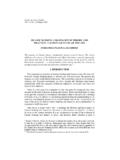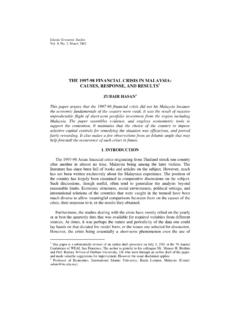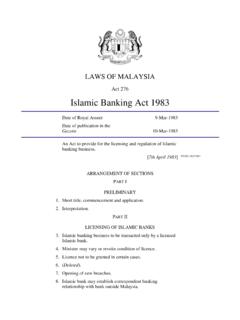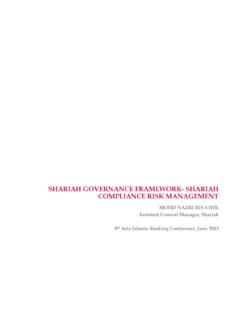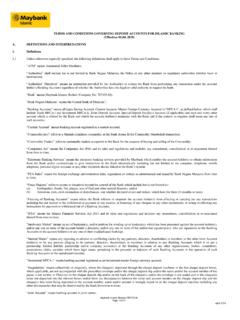Transcription of CHALLENGES AND OPPORTUNITIES FOR ISLAMIC BANKING …
1 ISLAMIC Economic Studies Vol. 7, Nos. 1 & 2, Oct. 99 & Apr. 2000 CHALLENGES AND OPPORTUNITIES FOR ISLAMIC BANKING AND FINANCE IN THE WEST: THE UNITED KINGDOM EXPERIENCE RODNEY WILSON* ISLAMIC finance has become increasingly significant in financial centres in the West, notably London, despite the regulatory hurdles presented by operating in a non-Muslim financial environment. The growth of ISLAMIC finance partly reflects demand from Muslim resident and non-resident clients for ISLAMIC deposit facilities and fund management services which involve shari ah compliance.
2 At the same time ISLAMIC financing methods are viewed as a challenge and opportunity by Western bankers, many of whom have sought to get involved in this growing industry. In client driven societies there is a willingness by those in financial services to listen and learn from the experiences of ISLAMIC banks, which in the longer run may bring a major break through for ISLAMIC BANKING at the retail level in the West. London has emerged as the major centre for ISLAMIC BANKING and finance in the West.
3 The aim of this paper is to examine the characteristics of the British market for ISLAMIC BANKING and financial services and analyse the activities of the major institutions involved. Regulatory issues are covered, which present a particular challenge in an environment where hitherto little account has been taken of the needs and preferences of Muslim clients, especially with regard to those who wish to respect the shari ah which prohibits interest based transactions. ISLAMIC financial products offered at the retail level include investment accounts, ISLAMIC portfolio management, commodity and equity based fund management facilities and ISLAMIC mortgages.
4 Muslim corporate clients can obtain short and medium term trade finance as well as leasing terms for equipment, although this is on a very limited scale at present, with Al Baraka as the main provider. ISLAMIC project finance can be arranged for both private and state organisations from Muslim countries, such financing usually being United States dollar denominated, although other currencies can be arranged on request. *Professor and Chairman, Department of Economics, University of Durham, England.
5 Rodney Wilson: CHALLENGES & OPPORTUNITIES for ISLAMIC BANKING : UK Experience 36 Despite the breadth of services on offer the extent of ISLAMIC BANKING and finance is limited in London, and the industry must be regarded as being in its infancy. Relatively few institutions are involved in ISLAMIC finance, and although some of these have dedicated ISLAMIC BANKING units, there is no wholly ISLAMIC bank. Most of the business is directed at international clients rather than the local Muslim community, who have little choice but to use conventional banks.
6 The management funds offered are based offshore in Luxembourg and Dublin to take advantage of the tax regulations in these jurisdictions. In June 1998 it is anticipated that a leading United Kingdom financial services group will launch an ISLAMIC fund which can be included in tax exempt Personal Equity Plans and will be eligible for the new Individual Savings Accounts to be offered from 1999. This should be more suitable for British Muslims who intends to remain United Kingdom residents. UNITED KINGDOM MARKET CHARACTERICS The largest volume of ISLAMIC financing business, which is booked in the United Kingdom at present, originates in Muslim countries, largely from the Gulf, although there is a large potential domestic market, which is only just beginning to be tapped.
7 The attraction of London for Gulf clients, which include all the major ISLAMIC banks, is the breadth of specialist financial services offered, the depth to the market and the solidity of the major banks, which include all the leading global players. London is nearer to the Middle East than New York, and in a convenient time zone for communications. Most Gulf businessmen and bankers have English as their second language, and many have long connections with the United Kingdom, where they and their families enjoy spending time.
8 The Arab commuity in central London is one of the most affluent in the world, and there are many Arab restaurants and hotels used to catering for the needs of Muslim visitors. London is also the second most important centre for the Arab media after Cairo, with its own Arabic newspaper and magazines, and an Arabic satellite television channel. There are over two million Muslim resident in the United Kingdom,1 most of whom are British citizens, and a majority have now been born in the The community consists of 350,000 households, the typical family being twice as large as the average family size in the United Kingdom.
9 A majority of the older 1 The 1991 census showed 476,555 persons from the Pakistani ethnic group, almost half of which were born in Britain, 162,835 Bangladeshis, 840,255 Indians, possibly 40 percent of whom are Muslims, 200,000 other Asians, a majority of whom were Muslims and 150,000 Arabs. See Ethnic Group and Country of Birth, HMSO, 1991, volume 1, pp. 403-407. Since then the Muslim population has grown, and by 1998 probably exceeded million citizens and permanent residents and 500,000 temporary residents.
10 Some estimates now put the number of Bengalis at 400,000. 2 Muhammad Anwar, Muslims in Britain in Syed Z. Abdein and Ziauddin Sardar, (eds.), Muslim Minorities in the West, Grey Seal, London, 1995, pp. 37-50. Rodney Wilson: CHALLENGES & OPPORTUNITIES for ISLAMIC BANKING : UK Experience 37 generation speak Urdu or other languages from the Indian sub-continent, but most speak at least some English in addition and can read with varying degrees of proficiency. The younger generation have English as their first language, and more learn other European languages at school such as French rather than Asian languages.

